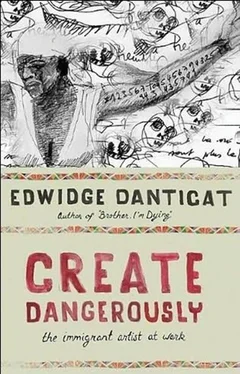We make our way en masse to the schoolhouse, a large open room with a dirt floor and tin roof. Tante Ilyana watches closely, narrowing her eyes, as Uncle Joseph gives special instructions to the headmistress and the builder. The headmistress puts in a plea for a blackboard for each of the new room’s four walls to enable children on different levels to work independently. The schoolmistress also asks the builder to assure her of a roof that won’t leak. She doesn’t want to have to stop classes and send the children home whenever it rains. Tante Ilyana, who had been cooking the occasional midday meal for the children since the school first opened, volunteers herself again.
“I’ll continue to do it,” she says almost to herself.
I reach over and rub her shoulders, thinking, perhaps over-thinking, that this is her way of making sure that other children are able to get the education that she had not.
After the schoolhouse, we walk over to the cemetery where my great-grandparents are buried. The tombs are made of cracked marble among knee-high weeds. Some of the names and dates, carved deeply on some tombstones and more superficially on others, have faded. There is no birth date for my great-grandmother Mirazine, from whom my father gets his name, Miracin, and his nickname, Mira. It is possible that her birth was never recorded at all in any public register. My great-grandmother died in 1919, during the 1915-1934 U.S. occupation of Haiti. My great-grandfather, Osnac, died after his wife did, my Tante Ilyana tells us, but the year of his death has long faded from his tombstone and her memory.
I announce that when I die, I too want to be buried in Beauséjour.
“Where would you find someone to carry you this far?” asks Tante Ilyana. “First from New York to Port-au-Prince, and then this two-day trudge up the mountains. It would be a lot of carrying.”
I assure her that there would be less carrying if I were cremated and my ashes scattered from the peak of one of the mountains.
“There is already enough dust in Haiti,” she says very matter-of-factly. “You should be buried where you die.”
Where I die will probably not be here in this place, I think, unless the descent from the mountain proves as fatal as I had believed the climb might be.
“Enough now,” says Tante Ilyana. “This is too much talk about dying.”
I return a few more times to my great-grandparents’ graves, often by myself. The year before, my first novel, Breath, Eyes, Memory , had been chosen for Oprah Winfrey’s famous book club, generously exposing the book to thousands more readers than I had ever dreamed or imagined. The novel attempts to tell the story of three generations of Haitian women. Ifé Caco, the grandmother, loses her husband to a chain gain. Martine Caco, the older daughter, as a teenager is raped by a brutal Tonton Macoute whose face she never sees. Atie Caco, Martine’s sister, harbors a secret unrequited love for another woman. Sophie Caco, the granddaughter, the narrator of the book, is the child who is born as a result of her mother’s rape. All of these women share a trauma: all had mothers who regularly inserted the tips of their fingers into their daughters’ vaginas to check that they were still virgins.
The virginity testing element of the book led to a backlash in some Haitian American circles. “You are a liar,” a woman wrote to me right before I left on the trip. “You dishonor us, making us sexual and psychological misfits.”
“Why was she taught to read and write?” I overheard a man saying at a Haitian American fund-raising gala in New York, where I was getting an award for writing this book. “That is not us. The things she writes, they are not us.”
Maligned as we were in the media at the time, as disasterprone refugees and boat people and AIDS carriers, many of us had become overly sensitive and were eager to censor anyone who did not project a “positive image” of Haiti and Haitians.
The letter writer was right, though. I was lying in that first book and all the other pieces of fiction I have written since. But isn’t that what the word fiction or novel on the book jacket had implied? Isn’t even the most elementary piece of fiction about a singularly exceptional fictional person, so that even if that fictional person is presented as an everyman or everywoman, he or she is bound to be the most exceptional everyman or everywoman fictional person of the lot? And how can one individual-be it me or anyone else-know how nine to ten million other individuals should or would behave? Furthermore, though I was not saying that “testing” happened in every Haitian household, to every Haitian girl, I knew many women and girls who had been “tested” in that way.
“You are a parasite and you exploit your culture for money and what passes for fame,” is the second most common type of criticism I get from inside the community.
Anguished by my own sense of guilt, I often reply feebly that in writing what I do, I exploit no one more than myself. Besides, what is the alternative for me or anyone else who might not dare to offend? Self-censorship? Silence?
During one of my visits to my great-grandparents’ grave, I had with me a book of essays titled Afterwords: Novelists on Their Novels , which features several writers discussing their published novels. So, while I was sitting at the gravesite, I wrote the following letter to my first novel’s main character, Sophie. And since the immigrant artist must sometimes apologize for airing, or appearing to air, dirty laundry, my note to Sophie was later published as an afterword in all subsequent editions of the book, becoming an addendum to the text.
Dear Sophie,
I am writing you this note while sitting on the edge of my great-grandmother’s grave, an elevated tombstone in the high mountains of Léogâne, overlooking a majestic lime-colored mountain range. Suspended as I am here, far from terra firma and close to the clouds, I feel that this is the only place in the world where I truly belong. This is the place that I most wished as a home for you too, the place I had in mind when I had Tante Atie stand with you in the middle of a cemetery plot and pronounce, “Walk straight, you are in the presence of family.”
I guess I have always felt, writing about you, that I was in the presence of family, a family full of kindness as well as harshness, a family full of love as well as grief, a family deeply rooted in the past yet struggling to confront an unpredictable future. I felt blessed to have encountered this family of yours, the Cacos, named after a bird whose wings look like flames. I feel blessed to have shared your secrets, your mother’s, your aunt’s, your grandmother’s secrets, mysteries deeply embedded in you, in them, much like the wiry vetiver clinging to the side of these hills.
I write this to you now, Sophie, because your secrets, like you, like me, have traveled far from this place. Your experiences in the night, your grandmother’s obsessions, your mother’s “tests” have taken on a larger meaning and your body is now being asked to represent a larger space than your flesh. You are being asked, I have been told, to represent every girl child, every woman from this land that you and I love so much. Tired of protesting, I feel I must explain. Of course, not all Haitian mothers are like your mother. Not all Haitian daughters are tested as you have been.
I have always taken for granted that this story, which is yours, and only yours, would always be read as such. But some of the voices that come back to me, to you, to these hills respond with a different kind of understanding than I had hoped. And so I write this to you now, Sophie, as I write it to myself, praying that the singularity of your experience be allowed to exist, along with your own peculiarities, inconsistencies, your own voice. And I write this note to you, thanking you for the journey of healing-from here and back-that you and I have been through together, with every step wishing that both our living and our dead will rest in peace.
Читать дальше












